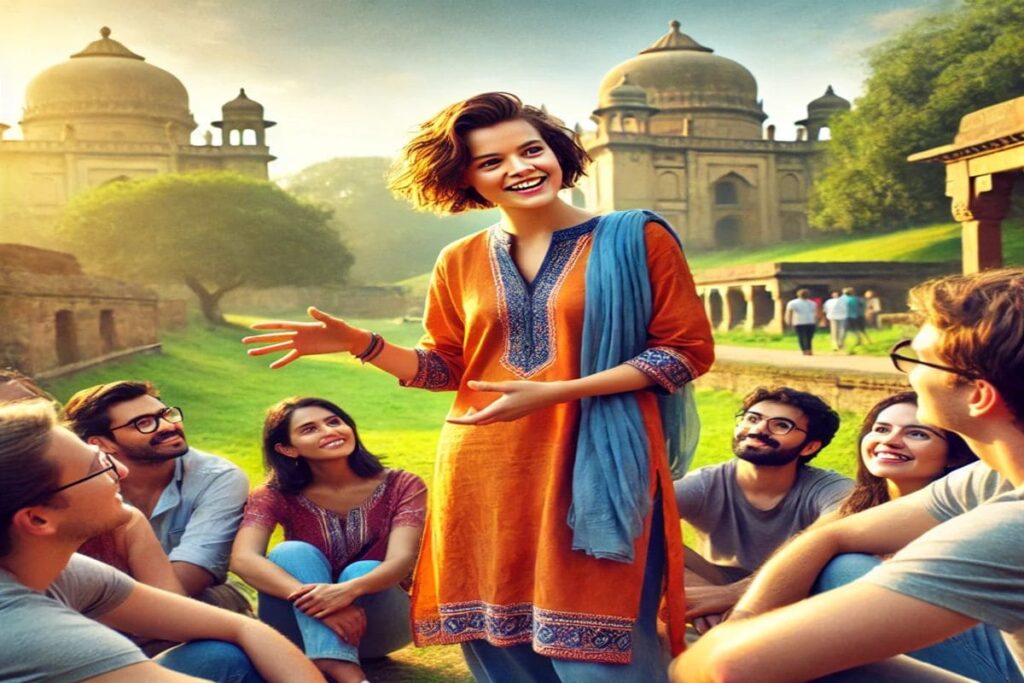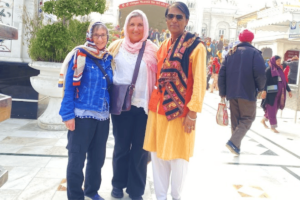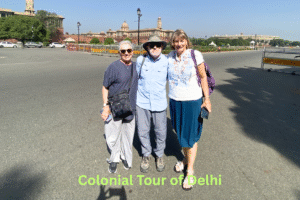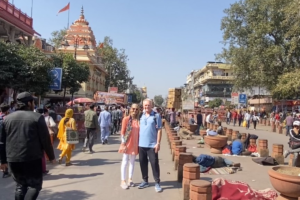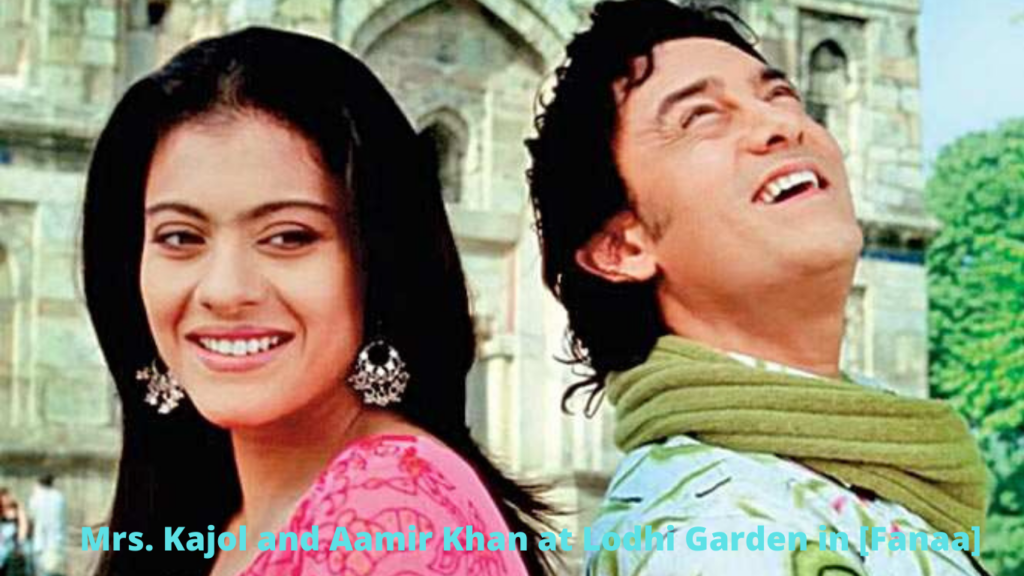Nestled in the heart of South Delhi, Mehrauli Archaeological Park is a hidden gem that invites you on a journey through centuries of Delhi’s history. Sprawling across 200 acres, this park is a treasure trove of ancient tombs, mystical stepwells, and forgotten palaces, making it one of the best places for a heritage walk in Delhi.
As you embark on this Mehrauli Archaeological Park walk, history unfolds with every step—whispers of the Delhi Sultanate, grandeur of the Mughal Empire, and echoes of the British Raj all coexist within its ruins. It is here that the past seamlessly intertwines with breathtaking landscapes, offering a unique blend of heritage and nature.
Wander through crumbling gateways and arched corridors, where Sultans once walked, and discover the fascinating stories hidden in Mehrauli’s monuments. From the eerie beauty of Jamali Kamali Mosque, believed to be haunted, to the architectural elegance of Rajon Ki Baoli, a stunning medieval stepwell, every corner has a tale to tell.
Beyond history, the Mehrauli Archaeological Park tour offers an experience that soothes the soul. The lush greenery, quiet pathways, and chirping birds create a serene escape from Delhi’s chaotic streets. Take a leisurely stroll, marvel at centuries-old tombs and mosques, and soak in the serenity of this historic wonderland.
For those who love a perfect blend of history, culture, and relaxation, the park also hides a few charming cafes where you can unwind after your Mehrauli walking tour. Whether you’re a history buff, a photography enthusiast, or a traveler seeking offbeat experiences, Mehrauli Archaeological Park promises more than just a walk through time—it’s an adventure waiting to be explored.
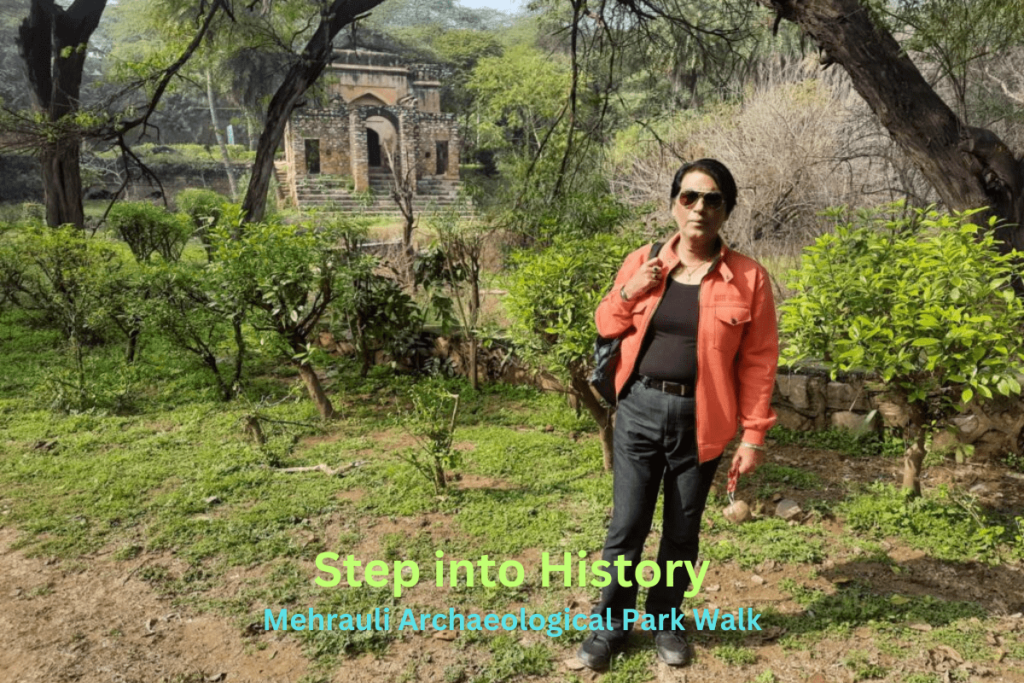
Mehrauli Archaeological Park Walk: Overview
Mehrauli Archeological Park Ticket Price: Foreigners- INR 200 Indians-INR 40
Pre Wedding Shoots: INR 5000, Commercial Video: 10000
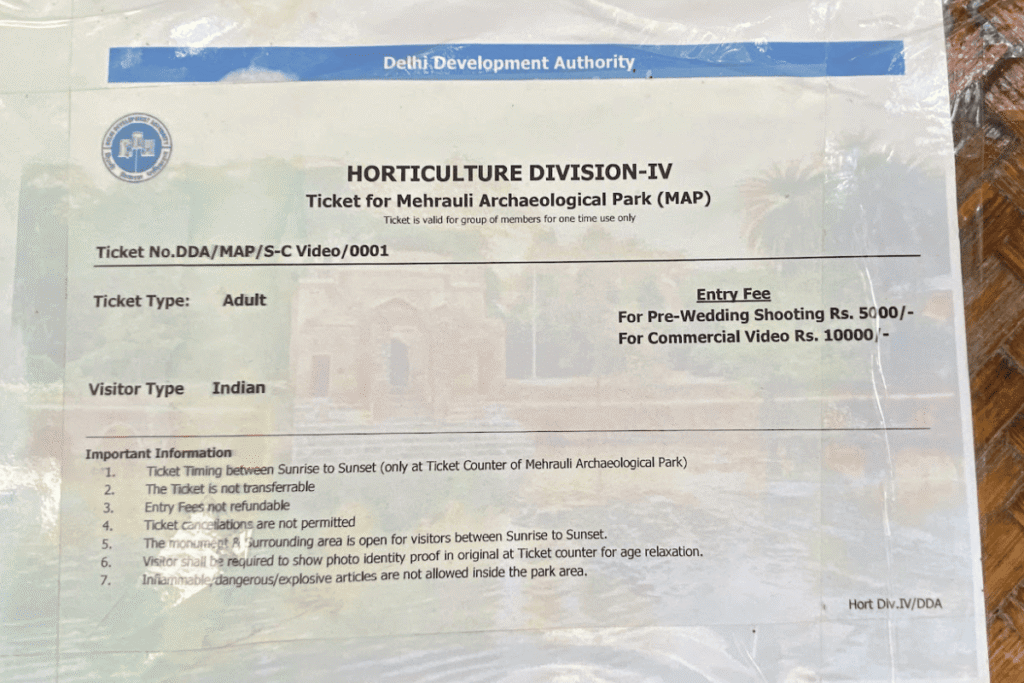
More Details: Govt of NCT Filming Guidelines
Meeting point : Entrance to the Mehrauli Archaeological Park or Qutub Minar Ticket Counter. There is no signboard that names the park.
Duration : about 4 hours around 5 km walk Price: INR 950 Per Person
Date : Call or Book in Advance, Confirmation will be received at time of booking
Time : can be explored anytime between sunrise and sunset. Best Time is in Day light
Who can come : All are welcome. But, the terrain is little rocky and some monuments are accessible only by steep steps. Might be uncomfortable for those who have difficulty walking
What to wear and carry :
• A moderate amount of walking is involved Easy Walking shoes. Carry mobile/Camera.
• This is a private tour/activity. Only your group will participate
• Covering for head for protection from the sun
What’s included in Mehrauli Archeological Park Heritage Walk with Qutub Minar
- Private walking tour
- Professional English-speaking guide
- Street Food as Lunch/Dinner
- Village Visit nearby
- Mineral water Bottle
Not Included: Tips and Personnel Expenses
Nearest Metro Station is Qutub Minar
Get down at Qutub Minar metro station. situated on the yellow line cross the road and walk right for ten minutes or and take an auto on sharing to reach the park. There are no entry Ticket.
If coming by own at Mehrauli archaeological park Car Parking is Near Jamali Kamali Mosque.
Mehrauli Archaeological Park Timing: 10:00 am – 06:00 pm Best time to visit : 02:00 pm – 04:00 pm
👉 Explore More Delhi Tours with Guide
Balban’s Tomb: The Forgotten Legacy of A Sultan
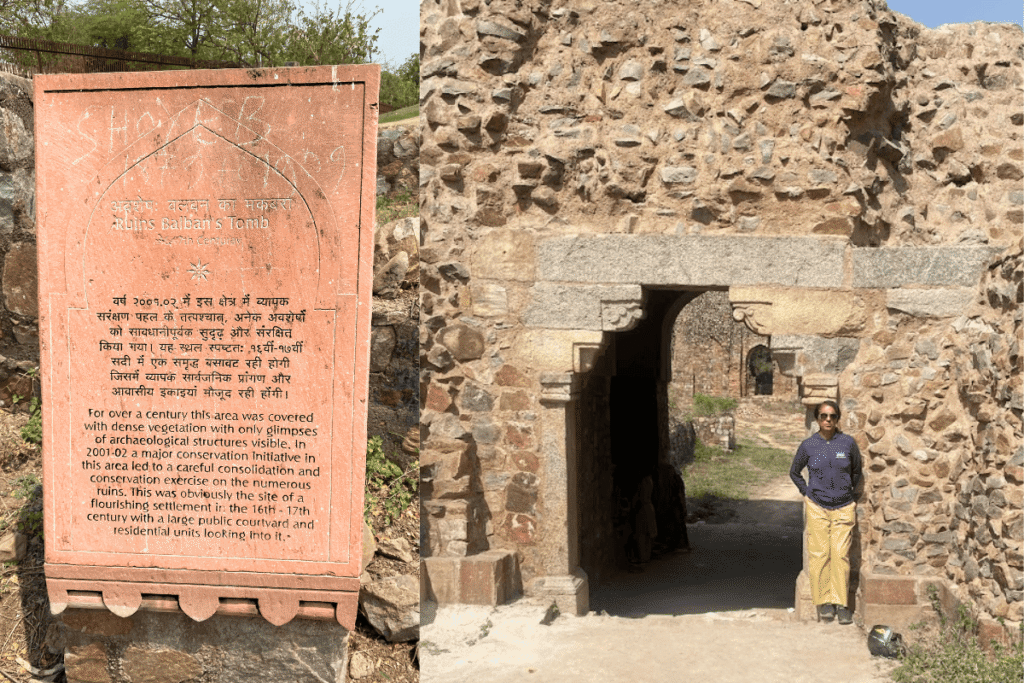
As we continue our Mehrauli Archaeological Park walk, we step into the hauntingly beautiful ruins of Balban’s Tomb, the final resting place of Ghiyas-ud-din Balban, a powerful ruler of the Slave Dynasty. Built in the 13th century, this site is not just a burial chamber but a milestone in Indo-Islamic architecture, as it houses one of the earliest known true arches in India.
Once a magnificent structure, the tomb now lies in quiet solitude, its walls crumbling with time, yet still standing as a testament to Delhi’s rich and layered past. The absence of a grand dome, unlike later Mughal tombs, adds to its mystique, making it a poignant relic of a bygone era. As you wander through its ruins, history whispers through the ancient stones, and the echoes of lost dynasties linger in the air.
It is here, in 1287 AD, that Sultan Balban found his final rest. Once a feared and respected ruler, his simple square tomb, open to the sky, stands as a silent witness to Delhi’s ever-changing history. This site is more than just an architectural landmark—it is a place of reflection, where the past meets the present, and where travelers on a Mehrauli Archaeological Park heritage walk can truly connect with Delhi’s forgotten stories.
Quli Khan’s Tomb: A Mughal Heritage in Mehrauli Park
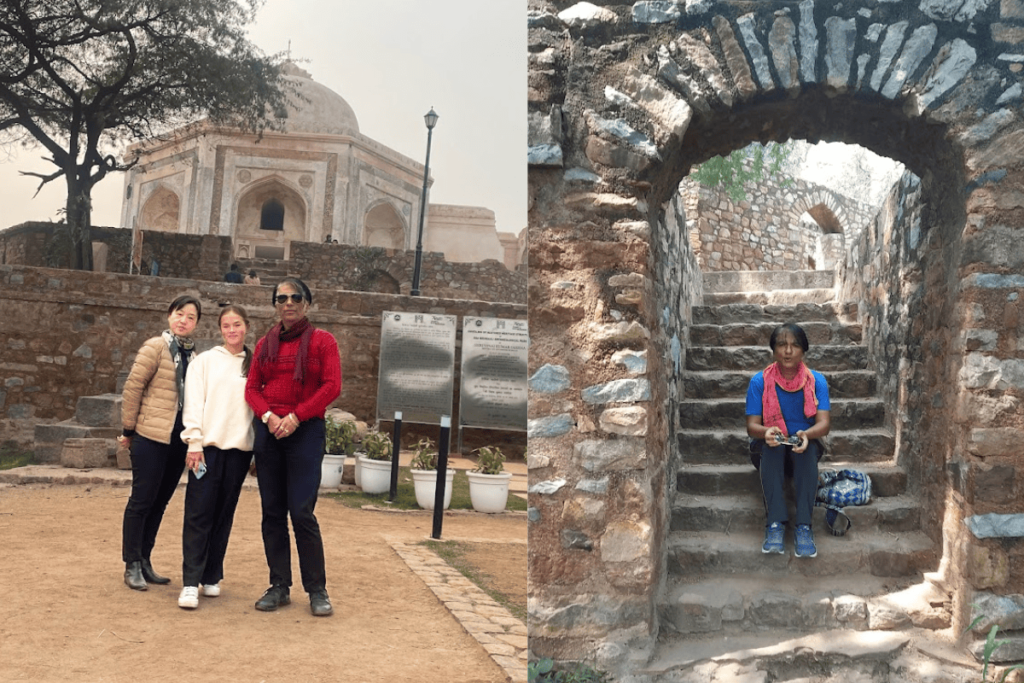
Tucked away in the lush landscapes of Mehrauli Archaeological Park, the Tomb of Muhammad Quli Khan is a hidden gem that blends Mughal grandeur with colonial elegance. Built in the 17th century as the resting place of Emperor Akbar’s general, this octagonal mausoleum later became Dilkhusha Mahal, a retreat for the British officer Thomas Metcalfe. Surrounded by European-style gardens, this site offers a fascinating fusion of Mughal architecture and British aesthetics. As you wander through this enchanting ruin, the whispers of history and the charm of its serene beauty make it a must-visit on any Mehrauli Archaeological Park walk.
Also enjoy the common trees of Delhi.
Jamali Kamali Mosque: Timeless Mysticism at Mehrauli Park
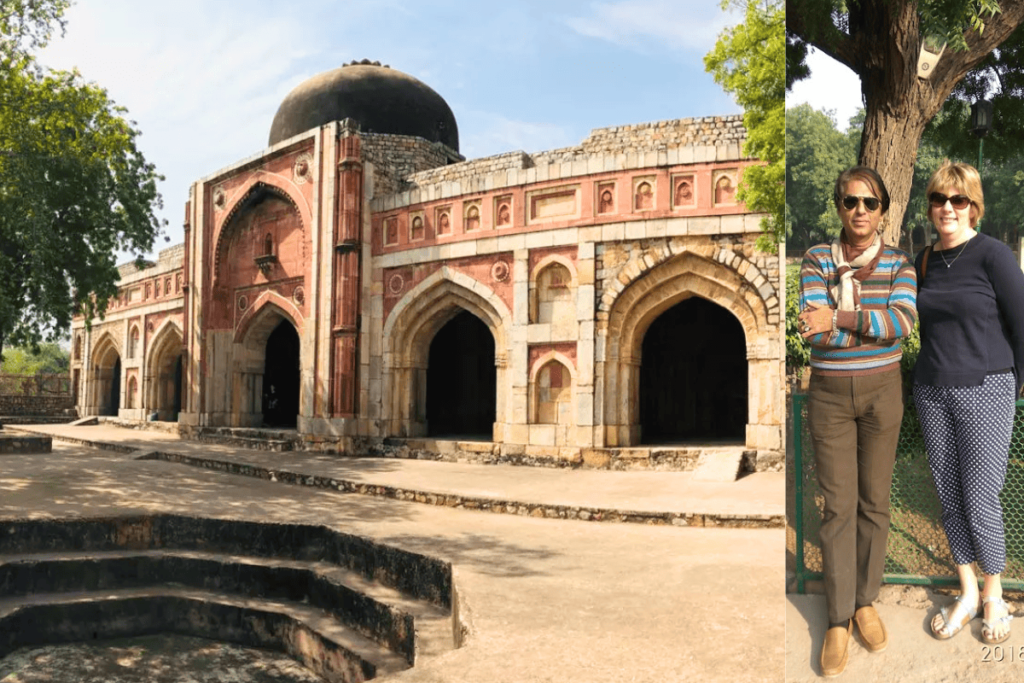
Step into the enchanting world of Delhi’s heritage with the Mehrauli Archaeological Park walk, where history comes alive in mesmerizing tales and architectural splendor. Hidden within this vast treasure trove lies the Jamali Kamali Mosque and Tomb, a site that exudes mystery, artistic brilliance, and whispers of an enduring bond.
Built in the 16th century, this mosque is named after Jamali, a celebrated Sufi poet and saint, and Kamali, his enigmatic companion. Their final resting place, adorned with intricate Persian-style tilework and Quranic inscriptions, radiates an air of spiritual serenity. The mosque’s vibrant red sandstone, delicate calligraphy, and geometric patterns make it a striking piece of Indo-Islamic architecture.
As you stroll through the park’s lush greenery, the air carries the echoes of Jamali’s poetic verses and the mystique of Kamali’s presence. Whether drawn by its architectural beauty, its rumored hauntings, or the poignant story it holds, Jamali Kamali Mosque remains one of the most captivating sites on the Mehrauli Archaeological Park heritage walk—a place where history, love, and legend intertwine.
See: Qutub Minar History Architecture.
Boat House: Metcalfe’s Romantic Retreat in Mehrauli Park
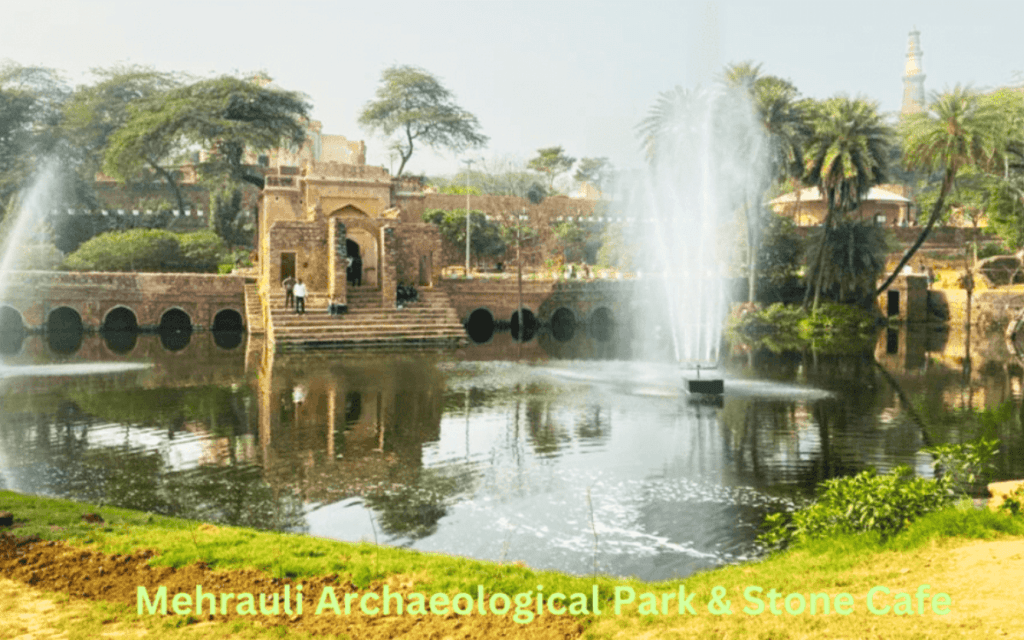
Nestled within the Mehrauli Archaeological Park, the Boat House, part of Metcalfe’s Dilkhusha retreat, is a fascinating blend of Mughal elegance and colonial creativity. Designed in the Indo-Persian twelfth-century style, this enchanting structure, also known as Itikaf, resembles a fortress-like lodge with a unique landlocked lighthouse, an architectural rarity in Delhi.
Located near Quli Khan’s tomb, the Boat House was once surrounded by flowing streams and a serene water tank, transforming the landscape into a tranquil escape. Sir Thomas Metcalfe, a British officer enamored with Mughal aesthetics, repurposed this space into a romantic retreat, with the main hall serving as a grand dining area, and wings converted into guesthouses, staff quarters, and stables.
Wandering through its Sido-Mughal-inspired structures, visitors can marvel at the intriguing fossil canopy, the whimsical zigzag and spiral designs of Garh Ganj, and the breathtaking views of Metcalfe’s picturesque gardens. The round apartment, once Metcalfe’s personal chamber, still stands with its fireplace intact, a testament to cozy evenings spent amidst Delhi’s timeless beauty.
A visit to the Boat House on the Mehrauli Archaeological Park walk offers a glimpse into Metcalfe’s dreamy Mughal-inspired vision, making it one of the most picturesque and historically intriguing sites in Delhi.
Enjoy: Lodhi Garden Walk with Nature and History.
Rajaon Ki Baoli: A Hidden Oasis in Mehrauli Archaeological Park

On the Mehrauli Archaeological Park walk, a magnificent stepwell quietly stands the test of time—Rajaon ki Baoli, one of Delhi’s finest Lodi-era stepwells, built in 1506 AD by Daulat Khan. Also known as ‘Rajon-ki-Bain’, this three-story subterranean marvel is a testament to medieval water conservation and Indo-Islamic architectural brilliance.
As you stroll through the park’s trails, this grand baoli suddenly emerges, its ornate arches and symmetrical pillars revealing a past where it once bustled with life. A deep staircase from the north leads down to a cool, shaded retreat, offering solace even in Delhi’s scorching summers. Twelve pillars on each side encircle the arched well, while an open southern passage connects the water tank.
The walls still bear alcoves, where flickering chirags (lamps) once illuminated evening gatherings, prayers, and cultural meetings under the night sky. The pillared courtyard, with its graceful arches, transports visitors to a time when Delhi’s rulers and commoners alike sought refuge in this serene space.
Sitting beside the cool waters of Rajaon ki Baoli, one can truly feel the mystical charm of Mehrauli, a hidden oasis of heritage and tranquility waiting to be explored.
Read: Agarsen ki Baoli a Haunting Step well.
Jahaz Mahal: The Floating Palace Near Mehrauli Archeological Park

Nestled within Mehrauli Archaeological Park, Jahaz Mahal is a stunning Lodi-era structure that appears like a ship floating on the reflection of the adjacent lake. Built as a resting place for travelers and pilgrims from Afghanistan, Arabia, Iran, and Turkey, it also served as a royal summer retreat.
The palace features a graceful U-shaped courtyard, intricate chhajjas, and a small mosque with a mihrab on the western wall. Adorned with blue-tiled domes and towering minarets, Jahaz Mahal now hosts the Phool Walon Ki Sair festival, celebrating Delhi’s rich Hindu-Muslim heritage amidst its historic charm.
Old Delhi Heritage Walk with Red Fort Jama Masjid and Rikshaw Ride.
Qutbuddin Bakhtiar Kaki: A Dargah of Sufi in Mehrauli
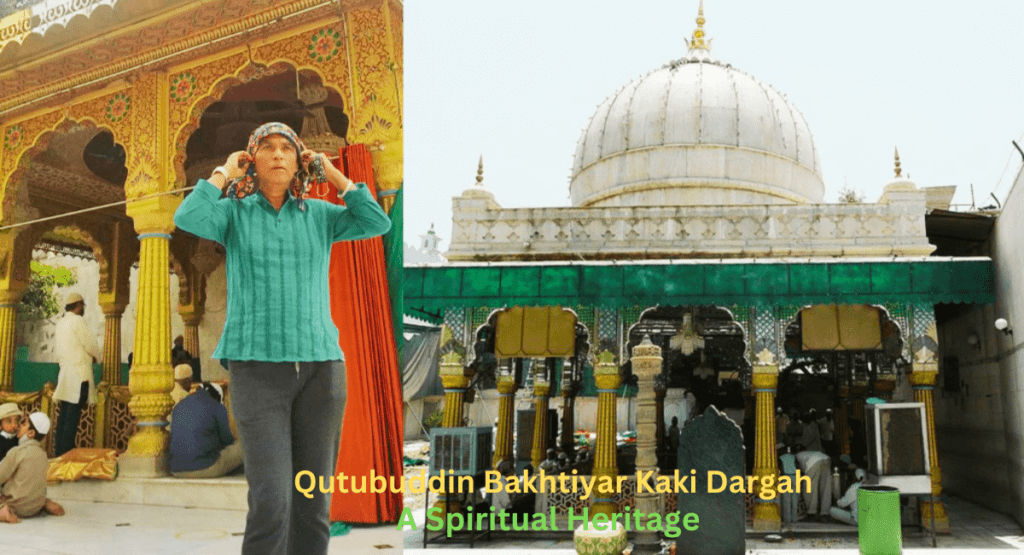
Nestled in Mehrauli, the Dargah of Qutbuddin Bakhtiar Kaki is one of Delhi’s most sacred Sufi shrines, drawing devotees seeking peace and spiritual solace. A disciple of Moinuddin Chishti, Qutbuddin Bakhtiar Kaki played a pivotal role in spreading Sufism in Delhi during the Sultanate era.
The dargah, adorned with intricate jaalis and Persian inscriptions, radiates divine serenity. Legends speak of angels descending to listen to his wisdom, and even today, believers arrive with deep faith, seeking blessings. A visit here is not just a step into history but a journey into the heart of Delhi’s spiritual soul.
See: Nizamuddin Dargah History and Qawwalies Walk.
Hijron Ka Khanqah: Nearby Mehrauli Archeological Park
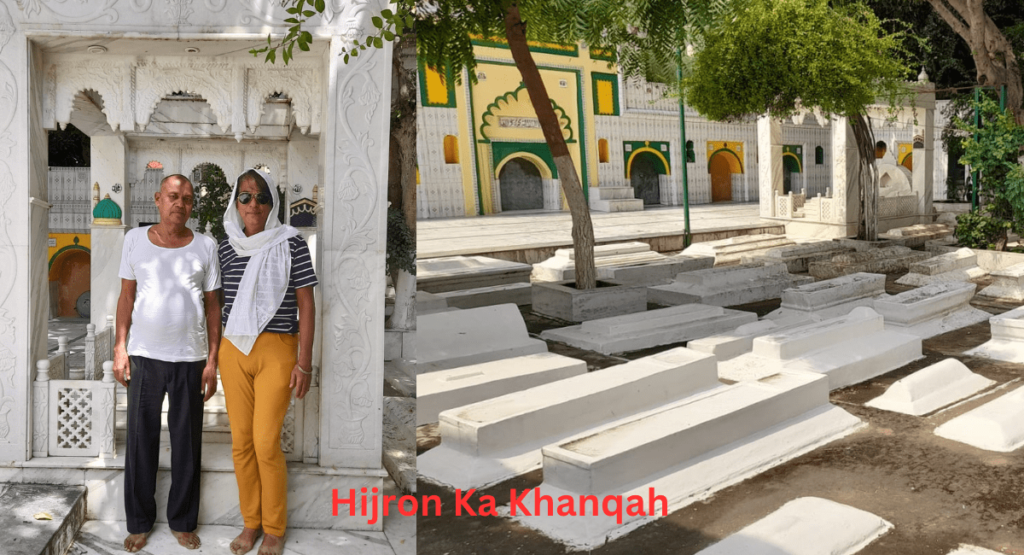
Tucked away in Mehrauli Archaeological Park, Hijron Ka Khanqah is a centuries-old Sufi burial site dedicated to the transgender community (Kinnars). This serene white-painted complex, often overlooked, serves as a spiritual refuge where eunuchs have sought peace and blessings for generations.
On Thursdays, childless couples visit to pray for children, while during Mahram, Eid, and Diwali, eunuchs from across India gather in celebration. The site includes a well-maintained mosque, primarily cared for by the community. The central tomb, believed to belong to Mian Sahib, symbolizes a history of inclusivity, faith, and cultural harmony.
Timings: 8 Am to 7 Pm Maintain the Decency of The Place as it is Sacred
Yogmaya Temple Delhi – The Spiritual Heart of Mehrauli Near Qutub Minar

Nestled in Mehrauli near Qutub Minar, Yogmaya Temple Delhi is one of Delhi’s oldest Hindu temples. Dedicated to Goddess Yogmaya, believed to be Lord Krishna’s sister, this temple dates back to ancient times when Mehrauli was called Yogini Pura.
Despite historical invasions, the Yogmaya Temple in Delhi was reconstructed in 1827 and remains an active place of worship. Its black stone idol, enshrined in a marble well, radiates divine energy. As the only pre-Sultanate temple still in use, the historic Yogmaya Temple Delhi stands as a symbol of Delhi’s spiritual heritage, attracting devotees and visitors seeking peace, blessings, and a connection to the city’s ancient past.
Adham Khan’s Tomb – A Mughal Era Marvel at Mehrauli
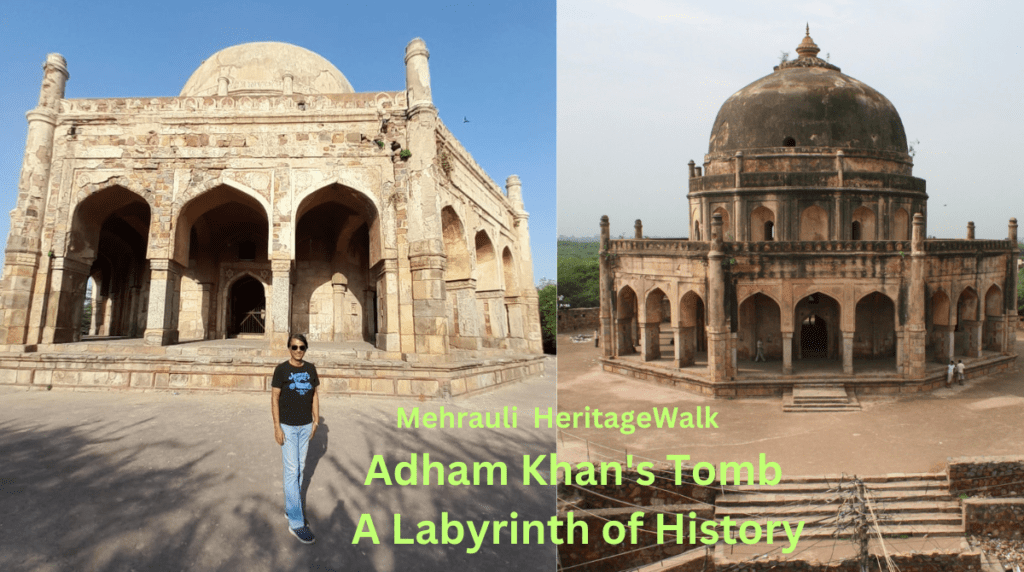
As you step into Mehrauli Archaeological Park, the majestic tomb of Adham Khan immediately captures your attention. Built in 1566 by Emperor Akbar, this octagonal domed tomb is an architectural rarity in the Mughal era. Adham Khan, a general in Akbar’s army and son of Maham Anga, met a tragic fate after assassinating Ataga Khan, a trusted advisor of Akbar. In response, Akbar had Adham Khan thrown from his palace, leading to his burial here.
Often called “Bhool Bhulaiyya” for its maze-like staircases, the tomb stands as a solemn reminder of power, betrayal, and Mughal history, nestled in Delhi’s heritage-rich Mehrauli.
St. John’s Church: A Hidden Gem in Mehrauli Archaeological Park

Nestled within the Mehrauli Archaeological Park, St. John’s Church is a remarkable blend of architectural elegance and interfaith harmony. Established in 1927 by the Bishop of Lahore, this historic church stands out with its fort-like structure, adorned with Arabic inscriptions and Urdu calligraphy, reminiscent of Mughal forts. Adding to its uniqueness, a soaring shikhara, inspired by Hindu and Jain architecture, crowns the church.
A must-visit hidden gem, St. John’s Church is not just a place of worship but also a perfect spot for exploration and Instagram-worthy moments amidst the tranquil beauty of Mehrauli Archaeological Park.
Jharna: A Mughal-Era Oasis Near Mehrauli Archeological Park
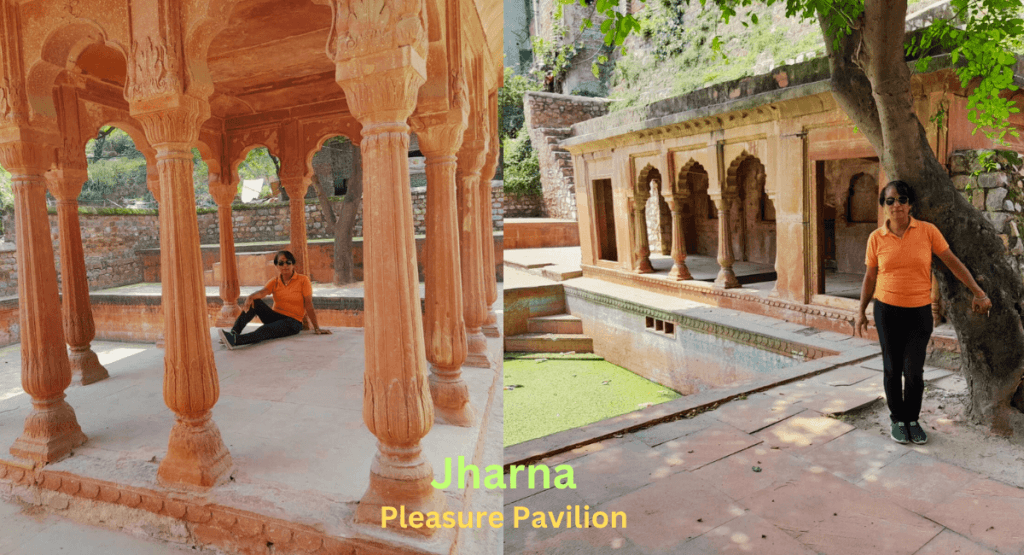
Hidden within Mehrauli’s historic landscape, Jharna is a Mughal-era pleasure garden that once echoed with the laughter of royalty. Built to channel the overflow from Hauz-e-Shamsi, this artificial waterfall was an engineering marvel, with its waters flowing over 10 kilometers to Tughlaqabad. Commissioned by Sultan Ghiyasuddin Khan Firoz Jang, Jharna was a serene retreat where the Mughal royal family sought solace from Delhi’s scorching summers.
Though its cascading waters have faded into history, Jharna still exudes an old-world charm. Amidst Mehrauli’s bustling market, it offers a tranquil escape—a perfect spot to reflect on the grandeur of the Mughal past.
Ahimsa Sthal: A Retreat of Peace and Spirituality Near Mehrauli Park
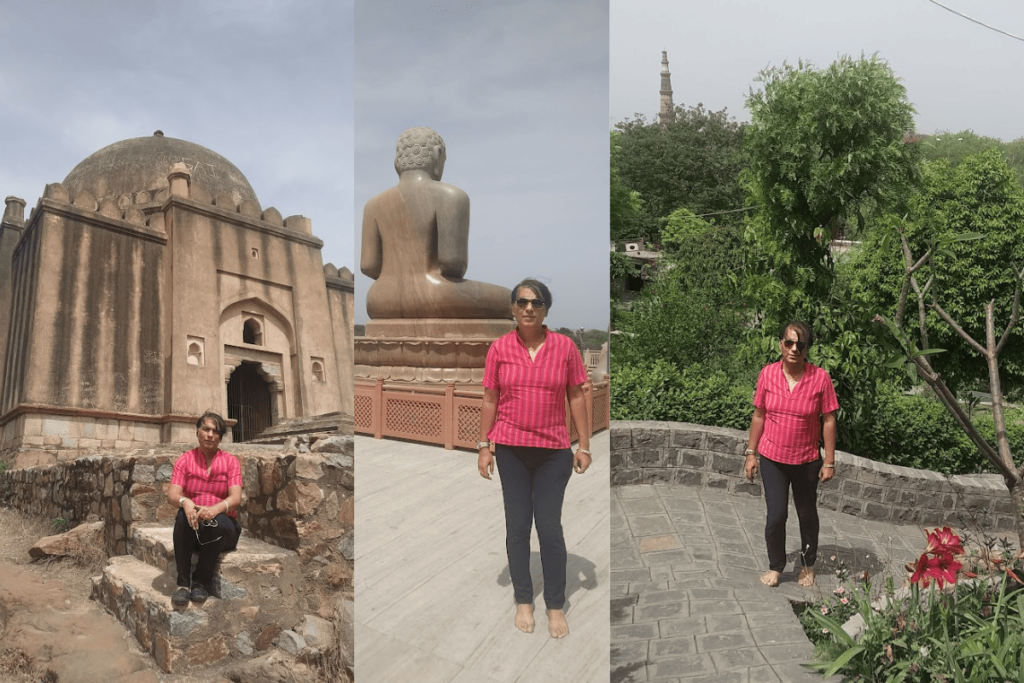
Nestled atop a tranquil hill in Mehrauli, just opposite the Qutub Minar, Ahimsa Sthal is a peaceful Jain temple dedicated to Lord Mahavira, the 24th Tirthankara. As you climb the hill, leaving behind the chaos of the city, you are embraced by lush greenery and an aura of tranquility, drawing you into a space of peace and spiritual reflection.
At the heart of Ahimsa Sthal stands a magnificent 13.5-foot-high granite idol of Lord Mahavira, seated in the Padmasana (lotus position), weighing 30 tons. The idol, flanked by two majestic stone-carved lions, sits atop a lotus-shaped podium, symbolizing purity and enlightenment. Surrounding the temple is a serene landscape adorned with stone pathways, where inscriptions of Jain teachings gently guide visitors on the path of non-violence (Ahimsa).
Standing here, one can take in a breathtaking view of the Qutub Minar, its silhouette whispering stories of time, while the calm ambiance of the temple offers a perfect setting for meditation, photography, or quiet introspection. Whether you seek spiritual connection or a moment of peace, Ahimsa Sthal is a hidden oasis in Delhi’s historic heart.
Visiting Hours: Daily 8 AM – 8 PM
Ashoka Mission: A Buddhist Heritage Site in Mehrauli
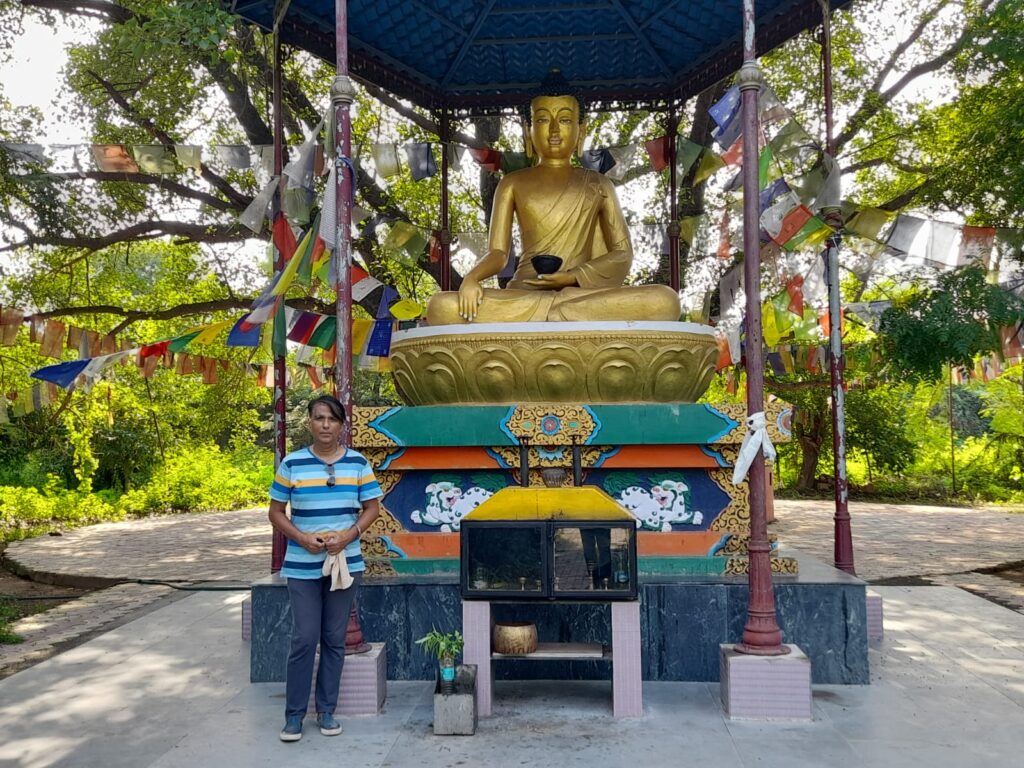
Nestled near Mehrauli Archaeological Park, Ashoka Mission is a significant Buddhist heritage site in Delhi, founded in 1948 by Cambodian monk Ven. Dharmavar Mahatra with support from Pt. Jawaharlal Nehru. This peaceful sanctuary has hosted esteemed figures like HH Dalai Lama, HH Panchen Lama, and Prince Norodom Sihanouk of Cambodia.
Spread over 12.5 acres, the mission houses a Buddhist temple, meditation center, and research institute dedicated to Buddhist studies. It also runs healthcare initiatives in Delhi and Ladakh. Visitors can experience tranquility amidst its lush greenery, making it a must-visit Buddhist site in Delhi.
Dargah of Ashiq-ul-Allah: A Hidden Sufi Shrine in Mehrauli
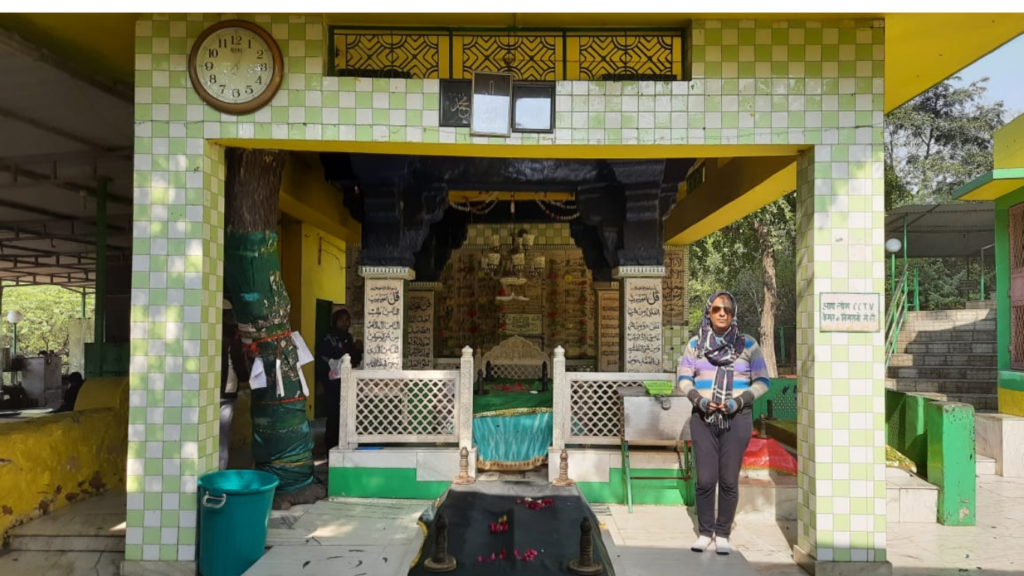
Tucked away in the historic lanes of Mehrauli, the Dargah of Ashiq-ul-Allah is a serene and lesser-known Sufi shrine in Delhi. Dedicated to Ashiq-ul-Allah, a revered Sufi saint, this dargah is a place of spiritual solace, where devotees seek blessings and immerse themselves in divine peace.
Located near Mehrauli Archaeological Park, the dargah embodies the mystical charm of Delhi’s Sufi heritage. With its simple yet soulful ambiance, it continues to attract seekers of spirituality, offering a moment of tranquility away from the city’s chaos.
See More: Dargah’s in Delhi of Sufi’s Saints and Peers.
Qutub Colonnade: A Historic Landmark with a Tragic Tale

Located near the Mehrauli Archaeological Park, the Qutub Colonnade is an architectural gem that carries a haunting modern history. Originally built using pillars from dismantled temples, it stands as a relic of Delhi’s layered past. However, this grand structure is also linked to one of the most tragic events in Delhi’s recent history—the Jessica Lal murder case.
Once a venue for elite gatherings, the Qutub Colonnade became infamous when Jessica Lal, a model and celebrity bartender, was shot dead here in 1999. The high-profile case sparked nationwide outrage and became a defining moment in India’s fight for justice. Today, as visitors walk through this heritage site, they not only witness its architectural splendor but also remember the resilience of truth and justice.
